“Playing with Reality” is the title of our upcoming book on synthetic media and the follow-up to our 2008 book “Me the Media”. Playing with Reality is about how humans continuously manipulate reality and how new digital technology tools enable us to go one step further in this ancient game. This includes modern phenomena like conspiracy theories such as QAnon, Deepfakes, and fake news, but also virtual humans such as CGI Influencer Lil Miquela and virtual worlds like Fortnite.
Erin Griffith, a tech journalist for the New York Times, coined the term “The YOLO FOMO LOL Economy” in two of her articles. We think it perfectly describes today’s meme society. In this #10 issue you will probably experience some fear of missing out yourself. As the crazy crypto economy booms you might want to consider some of the ideas explained in this newsletter. For instance buying an NFT horse, starting your own Scamcoin or sending your kid to a blockchain class. Enjoy the reading and the money you can make before the bust.
| We’re All Crypto People Now |

“Conversations around cryptocoins are nowadays happening in group texts, Twitter threads, Zoom rooms and Clubhouse panels across the country as the once-niche world of digital currencies has invaded the mainstream via art, sports, entertainment and media. In the process, Bitcoin and other cryptocurrencies have gone from curiosity to punchline to viable investment, making them almost impossible to ignore — for better or worse.” Erin Griffith continuous:
“The result? Dogecoin, a joke currency based on a meme about a Shiba Inu, is a hot topic on CNBC. Coinbase, a crypto exchange, is now a publicly listed company worth $58 billion. WeWork plans to accept crypto for rent. Wall Street banks are offering digital currency funds to their high net worth clients. There is a blockchain class for kids. The following items can be bought and sold as NFTs: an album by Kings of Leon, some pictures of Rob Gronkowski playing football, digital horses for breeding and racing, virtual sneakers, a recording of farts, a tattoo on Croatian tennis player Oleksandra Oliynykova’s arm, that meme of a photobombing seal, the world’s most colorful color, the scientist George Church’s genome, U.S. Patent No. 10,025,797, the word “porn,” and somehow, a house. And Lindsay Lohan keeps tweeting about Bitcoin.”
| What Is The Meaning Of All This Money? |
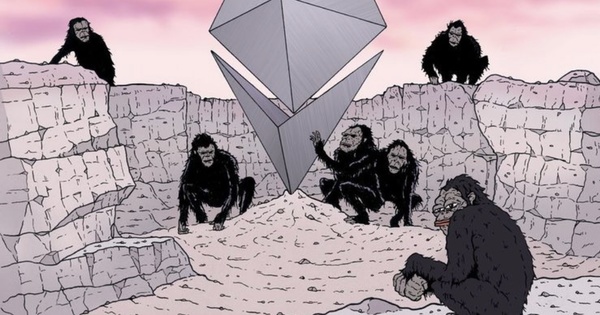
Welcome to the non-fungible, memeified, cryptodenominated, degenerate future of finance. Something is changing in how we think about money. Maybe the question we should be asking is “What is the meaning of all this money?”“Every day, some new money weirdness crosses our feeds: teenage TikTok stars apologizing for recommending a Star Wars–themed cryptocurrency that turned out to be a scam, a longhair trader best known as DeepFuckingValue and Roaring Kitty testifying before Congress, the R&B singer Akon announcing he’s building a new city in Senegal that will operate on his proprietary cryptocurrency. Naturally, the Jack Bogle of this moment is the fratty founder of Barstool Sports, Dave Portnoy, who launched an exchange-traded meme-stock fund earlier this year and whose sex tape was recently blamed for a dip in the stock of a gambling company he’s heavily invested in. His biggest rival for meme-economy influence is Elon Musk, who has the ability to tweet a single phrase — for example, “Use Signal” — and cause a defunct penny stock to rise 6,000 percent. Of course, they are not the only stars of the moment. There’s Beeple, the millennial artist whose animated-GIF NFTs sell in the tens of millions of dollars. And following a sort of nursery-rhyme logic that seems as rational as anything else about the economy, Shaq has launched a SPAC in partnership with one of Martin Luther King Jr.’s sons.”
| The Digital Kentucky Derby May Soon Be Real |
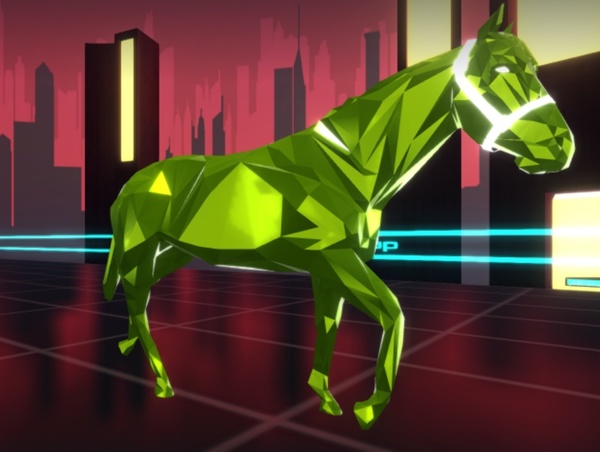
This week two interesting articles have been written about these NFT horses. One was written in The Athletic and the other one in The New York Times. Fans of digital horse racing often talk about the “metaverse,” a shared space where physical and virtual reality meet. Zed Run will be the first digital sport of the metaverse. From The Athletic:“Zed Run’s horses are digital and live on your phone or computer rather than flesh and blood in a stable, and they exist as authenticated data on the Ethereum blockchain network. But unlike most NFTs, the Zed Run horses can be bred (which is a buy-sell touchpoint for users) to create new ones, and like their real-world equine counterparts, each NFT horse has digital attributes that affect its racing.The game currently has 30,000 to 40,000 users across stable ownership and its Discord community. Users are running about 1,500 races a day, and each race and each horse has an actual human behind the ownership of that horse. Users can make money by winning races, by breeding horses, and by flipping on a secondary market like OpenSea, where they’re selling for thousands of dollars.”
| TikToker Makes A Scamcoin |
TikToker Andre Lewis (@dreesuschrist) recently decided to make ‘Scamcoin’, or ‘Simple Cool Automatic Money’, as a joke and within an hour after he published a video about his big idea, the market cap for his coin rose to over $70 million. However, Lewis won’t get rich by selling his coin, because he holds 95 percent of all the coins. So as soon as he tries to sell, it will saturate the market and crash the price. The whole idea might be crazy, but I guess more people will start to create their own coin and someone will hit the jackpot…
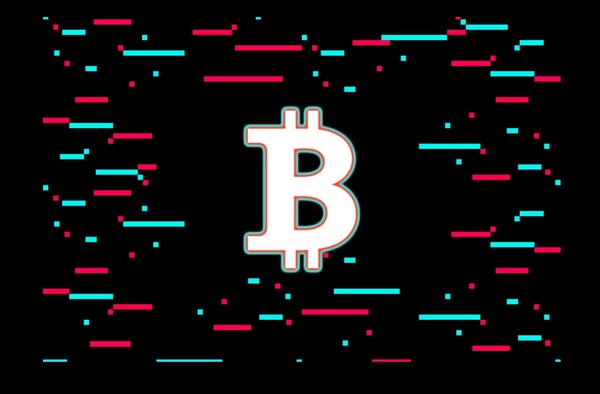
| Disaster Girl Meme Sold As NFT |
Zoe Roth was four years old when her amateur photographer father took the iconic picture. She became the face the beloved meme — which features a young girl smiling slyly into the camera as a house burns down behind her. Now she made bank — by selling the original image of her meme as an NFT for close to half a million dollars.

The ‘Disaster Girl’ just made close to half a million by selling the NFT of her meme
Zoe Roth, better known as the subject of the “Disaster Girl” meme, has found a way to monetize the iconic image — by selling it as an NFT.
| Every Company is a Tech Company Now |
| “Amid the disruption, pain and loss of 2020, the global pandemic provided a rare window into the future of business as it unfolded in real time. As governments in the U.S. and elsewhere stumbled, business loomed larger than ever: developing vaccines at record speed; providing the technology that enabled remote school and work; and keeping millions of people fed, clothed, entertained and in touch with ramped-up digital services. The scope and speed of change was unprecedented, accelerating digital adaptation by as much as five years in a 12-month period. Disruption ruled, as legacy companies imploded. Everything that could be digitized was, from education and exercise to currency and cars. Nearly every business has become a tech business, one reason stocks have soared even as the pandemic devastated lives and livelihoods across the globe.”The result of this idea, that every company has become a tech company due to the Corona pandemic, has resulted in a new list of the 100 most influential companies according to Time Magazine. It’s an interesting list that makes perfectly clear how our future will unfold itself. |
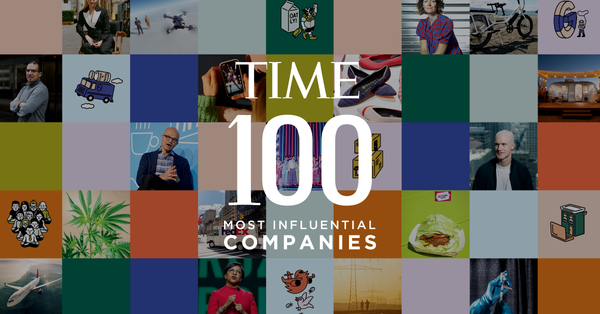
| Introducing the TIME100 Most Influential Companies of 2021 |
| Introducing the 2021 TIME100 Companies: TIME’s inaugural list of the world’s 100 most influential businesses |
| Fact of the Week: Changing Media Consumption |
| It always impresses me to see how much our media behavior has changed in just a single decade. |
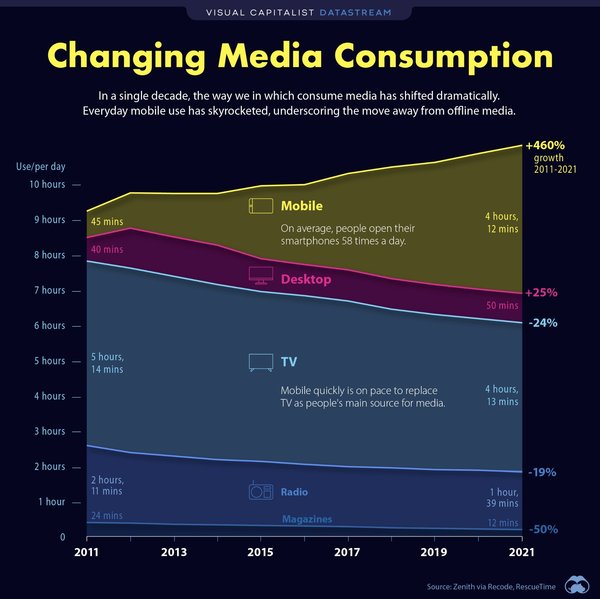
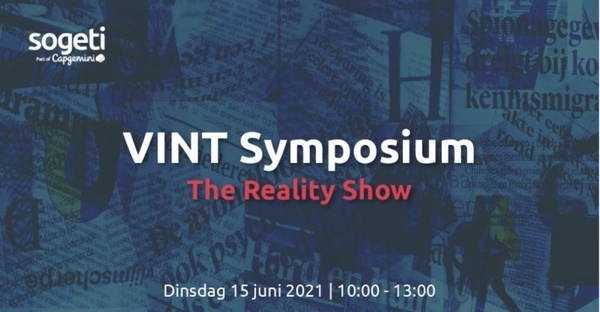
| On the 15th of June 2021 we are organizing our yearly summit. This year we try to answer the question how digital technology is changing our relationship with reality. So if you want to know more about deepfakes, virtual humans, cgi influencers, synthetic media, AR, VR and mixed reality, please register yourself. And it’s free! |
| Contact |
| Playing with Reality is a weekly newsletter in which SogetiLabs’s Research Institute VINT examines the future where synthetic reality becomes part or our objective reality. We investigate the impact of new technology on people, organisations and our society. If you have any questions or comments, do not hesitate to contact us. You can reach us at vint@sogeti.com. |

 English | EN
English | EN 